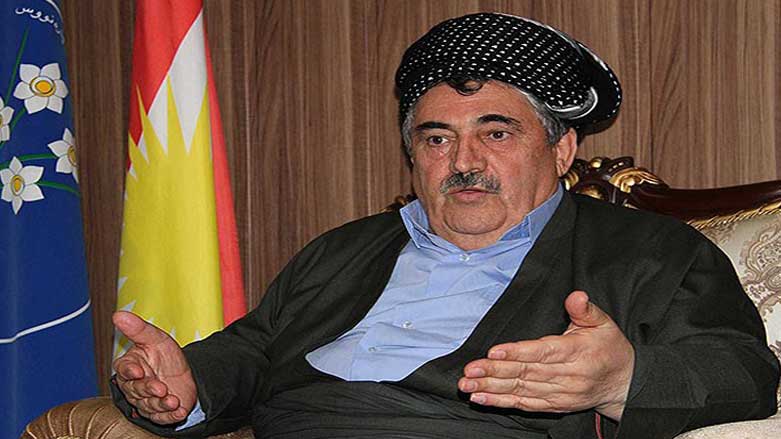Region’s political map soon change

ERBIL, Kurdistan Region (K24) – Hama Haji Mahmoud, Secretary-General of the Kurdistan Socialist Democratic Party, told K24 in an interview on Sunday that Iraq is undergoing many significant changes. that may affect its political map.
Mahmoud, affectionately known as “Kaka Hama,” is a well-known political leader and respected Peshmerga veteran who commands Peshmerga forces in south of Kirkuk. Since the beginning of the war against Islamic State (IS), he has been fighting on several front lines including Kirkuk and Jalawla. In December 2014, his son, Atta, was shot and killed by an IS sniper while trying to retake a village in Kirkuk Province from the jihadist fighters.
Recently, political affairs of the Kurdistan Region have become an intense topic of discussion among different political parties and particularly since Kurdistan Regional Government (KRG) President Masoud Barzani proposed holding a referendum regarding the Kurdistan Region's independence. Kaka Hama believes the internal situation in the Kurdistan Region is connected to the wider situation in the Middle East, “The sacrifices Kurds have made in this war made them a principal factor in the region” he stated.
“The situation has become far too complex for one government to be able to solve the issues here alone” Kaka Hama added. He cited that the American-led anti-IS coalition, the Russian partnership with Iran and Syria, and Saudi Arabia’s coalition as proof that all three sides want to have an effective role in the region after the war against IS.
Mahmoud mentioned the achievements and sacrifices of Kurds in the war against IS, “many lives have been lost in the front lines or in Sinjar, for example.” He stated one of the main Kurdish achievements was the diplomatic support from the international community after Peshmerga proved to be the most capable and reliable forces on the ground in stopping jihadists. “We must try to be united to protect the balance that Kurds have achieved to cope with the changes in the region” he added.
Kaka Hama also pointed out this regional war against IS in Iraq, Syria, Libya, and other countries may be the last war before the Middle East map changes. He counted Kurds as 'winners' in terms of military, international relations, and diplomacy. “But we still need legal achievements and political agreements” he explained. In Syria, where IS controls about 50 percent of the territory and in Iraq, where IS controls about 40 percent of the territory, Kurds have taken back 40 percent of the “disputed areas” of Kurdistan from IS control, according to Mahmoud.
Mahmoud is a supporter of the Kurdistan independence referendum and emphasized that no country would give us independence as a gift on a silver platter. He believes that political parties alone cannot decide on Kurdistan independence, and that “The people must have the final say.”
He referred to the Sykes-Picot agreement of 1916 as well, “it is not addressed in the agreement that it will expire after 100 years, but normally after a century significant changes are expected.” Sykes-Picot was an agreement between Great Britain and France by which most of the Middle East formerly under the rule of the Ottoman Empire became divided between two “spheres of influence” after World War I. Sykes-Picot divided these areas without the will or consideration of the diverse populations. Among others, Kurds were one of the groups left without their country as a result of this important international agreement. In the past, Masrour Barzani, Chancellor of the Kurdistan Region Security Council, has said Kurds are the victims of this agreement.
Kaka Hama explains, “The vision [of Sykes-Picot] was to build a strong Iraq from the Ottoman Empire provinces of Mosul, Basra, and Baghdad...but on the contrary, Iraq led us to war with [neighboring] countries. As an example, why did Iraq wage war against Iran and Kuwait?” For Mahmoud, the failure of Iraq as a unified state calls for the international community to reconsider the political map of the region.
Kurds now have all the necessary elements to build an independent state, including leadership, military force, land, and population, Kaka Hama explained. He elucidated that the possibility to changes in the political map of the region will happen sooner or later.
“There is no unified Iraq anymore,” Mahmoud said. “We must all together think of a new experience in Iraq. Maybe we can come up with a confederal system,” he added.
“In the current situation in Iraq, no one accepts the other groups. The Iraqi government expects the U.S. air force, Russian planes, Peshmerga, or Hezbollah to protect them. When a government cannot protect its borders, what kind of unity exists anymore?” Mahmoud stressed.
(Noori Bekhali as the interviewer contributed to this report)
